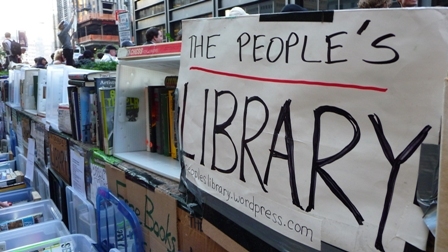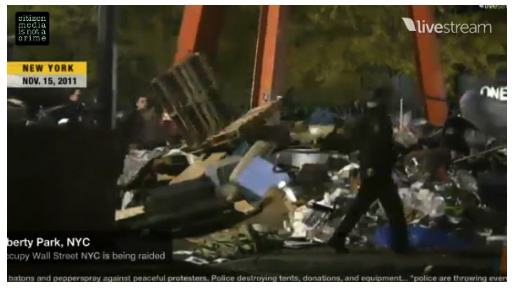“Nazis destroyed books to ‘purify’ German culture. Bigots do it in the name of God, or Allah. What’s Bloomberg’s excuse? ‘Hygiene’?”
– Salman Rushdie, via his Twitter account, 16 Nov. 2011
“If corporations are people, tents are definitely speech.”
– Ben Chappell, prof. of American Studies, University of Kansas (via Eric Michael Johnson [@ericmjohnson on Twitter], who credits @rmmilner and @docfreeride as his sources), 15 Nov. 2011.
The term “fascist” is used too often and too loosely in American political discourse. Mayor Bloomberg is not a fascist. However, in ordering the destruction of a library, the mayor’s actions evoke the symbolism of fascist and other totalitarian regimes. One expects that he did not intend a metaphoric alliance with such groups. Indeed, he wisely ordered the books to be thrown in the dumpster, rather than having them set on fire.
But Salman Rushdie – who knows a thing or two about the destruction of books – is not wrong when he hears parallels between Nazis’ attempts to “purify” culture via the destruction of books that (they alleged) would pollute minds, and Bloomberg’s claim that he’s acting to promote “the health and safety of the public.” That was his explanation for the Tuesday 1:30 am attack on Occupy Wall Street, and the destruction of its library. And you can see the appeals of his rhetoric: who would argue against “guaranteeing public health and safety”? Unfortunately for the mayor, evidence contradicts his rhetoric. Though Mayor Bloomberg worked to prevent reporters from covering the raid (for their own safety, he alleged), too many people were able to capture the event on film. Looking at those images, the chaos and violence of the assault does not resemble either “health” or “safety.”
Which is precisely why Mr. Rushdie’s parallel gains symbolic force. As the mayor’s predecessors (fascist and otherwise) have done, Mr. Bloomberg uses language to mask ideology. In a delightfully Orwellian use of language, he claims the twin goals of “guaranteeing public health and safety, and guaranteeing the protestors’ First Amendment rights” but, since (he said) the former outweighed the latter, “inaction was not an option.” In other words, he needed to attack peaceful protesters in the middle of the night, while they slept, because they posed a danger to the public. This sounds a bit like George W. Bush’s doctrine of preemptive war: the protesters may pose a danger, and so Bloomberg had to attack them before they did. It also echoes the U.S. Army Major in Vietnam who, speaking to a reporter in 1968, said, “It became necessary to destroy the town to save it.”
The accidentally fascist overtones of the mayor’s purposefully thuggish order may be the greatest gift he could give the Occupy Wall Street movement. Not only is the violence of this nighttime attack likely to galvanize the Occupy Wall Streeters, but it may also persuade others to join them. When you wage war on a library, you wage war on all who read, write, and think. When you attack books, you attack democracy. And when you do these things, people fight back.
As Ben Chappell observes, “If corporations are people, tents are definitely speech.” And libraries are both.


